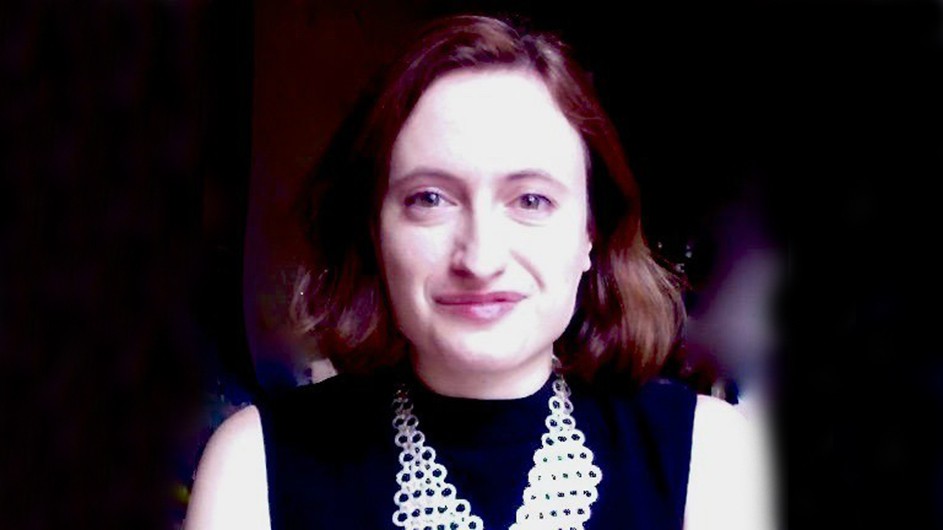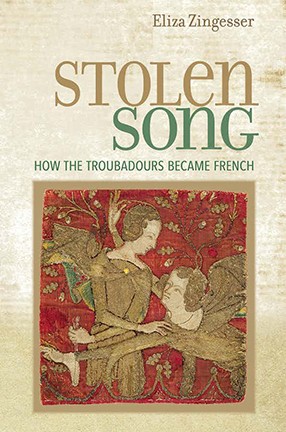A Professor Finds An Act of Cultural Appropriation in Medieval Literature
In her new book, "Stolen Song," Eliza Zingesser questions the founding of French troubadour poetry.

Most scholars would find the claim that troubadour poetry is the origin of French literature uncomplicated and uncontroversial. However, Professor Eliza Zingesser argues in her new book, Stolen Song, that the “Frenchness” of this tradition was invented and constructed by francophone medieval poets and compilers keen to devise their own literary history. She recently discussed the book with Columbia News, along with her interest in the Middle Ages, books she recommends for our age of quarantine and her current research project.
Q. How did you come up with the idea for this book?
A. I was struck by the fact that troubadour song is often presented as the earliest extant example of “French” literature, even though it was composed in a region—Occitania, what is now southern France—at war with (mostly) French forces and in a language, Occitan, that is a Romance vernacular distinct from French. I became interested in how this happened and decided to look at the earliest French readers of troubadour poetry to see what they did with it. What I found was that, even in the earliest stages of its transmission in France, troubadour song was construed as French.
Q. How does Stolen Song document the rescripting and domestication of troubadour song?
A. I look at the earliest sources of evidence—the songbooks that compile troubadour song and the romances that quote it. They transmit troubadour song anonymously, in a hybrid language that is closer to French, and only rarely flag its cultural and linguistic otherness. Some sources also rewrite troubadour song to make it more universal by erasing references to historical events and proper names and, instead, inserting elements that you would usually find in a generic medieval love song.

Q. Why do you call what occurred with troubadour song an act of cultural appropriation?
A. It’s cultural appropriation because there is evidence of a desire to construe troubadour song as part of the same tradition as medieval French song, and to see the two as culturally unified. The clearest example of this is in a bizarre and wonderful poem, where an Occitan knight has sex with a beautiful French woman (descended from a siren and a nightingale), and they seem to give birth to a hybrid language poem. The siren and nightingale are, obviously, symbols of song, and they are framed as part of France’s lineage, rather than Occitania’s. This, despite the fact that all the historical evidence suggests that troubadour song antedates French song.
Q. What about the simultaneous creation of an alternative point of origin for French literary history that the book also covers?
A. At the same time that scribes and writers were making troubadour poetry look more French, they also produced a corpus where French songs are made to look Occitan. These songs are not written in real Occitan, but in a strange dialect, an imitation of Occitan that would probably not have fooled anyone. These songs are not imitations of the prestigious genres in Occitan (Occitan love poetry was the most famous poetry in all of medieval Europe). Instead, they are mostly burlesque songs or songs in minor genres, sometimes involving crude sexual humor. One of them involves the rape of an Occitan shepherdess by a knight who appears French, and the rape results in the shepherdess being “cured” of the Occitan dialect traits in her language. I think the corpus serves to demote Occitan as a language and to make Occitan poetry appear culturally inferior.
Q. How did you develop an interest in medieval literature and history, and why do you think so many people view the Middle Ages as dusty and boring?
A. I’ve always found feminist approaches to literature appealing and that approach is especially productive in medieval literature, where there’s a discrepancy between how women were often depicted in literature (with power and sexual agency) and their historical reality. Some people probably think the Middle Ages are dull because they haven’t been exposed to the right material.
Q. What books can you recommend during this time of quarantine?
A. If you want to read a medieval classic, Boccaccio’s Decameron, which is set in Florence against the backdrop of the plague, is a terrific choice. Camus’s The Plague would be another topical classic.
Q. What's the last great book you read?
A. I devoured Magda Szabó’s Abigail in one sitting yesterday. I would highly recommend Szabó. Last week I read Ta-Nehisi Coates’ Between the World and Me, which is breathtakingly beautiful and so important.
Q. What is on your reading list now?
A. Yoko Ogawa’s The Memory Police and James Meek’s To Calais, In Ordinary Time.
Q. What are you working on now?
A. I’m working on a chapter for my second book, which is about birdsong and the way in which it becomes a trigger for what we would now call involuntary memory. The book is tentatively titled Eloquent Animals, and it deals with nonhuman animals, especially birds, and theories of language and rationality.
Q. You're hosting a dinner party. Which three scholars or academics, dead or alive, do you invite and why?
A. Can I invite fiction writers instead? If so, I would invite Virginia Woolf, Sappho and Emily Dickinson. I’m completely uninterested in the biographies and personalities of the writers whose work I read (even when I love it), but those three are the exceptions.